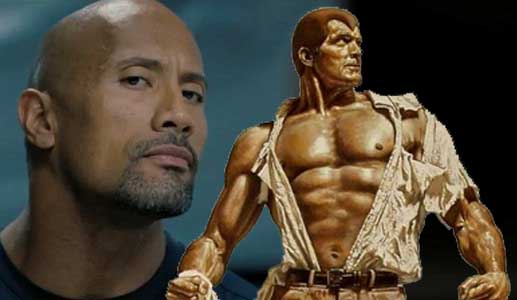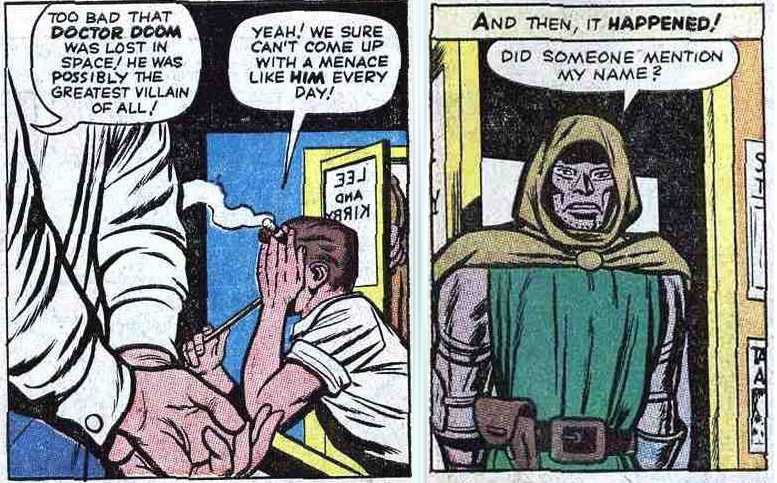A Look at the History and Importance of Doc Savage, the #WorldsFirstSuperhero
The Rock-tor is In.


(via Art of Comics, art by Bob Larkin; Dwayne Johnson via Universal Pictures)
Let’s begin with some names you probably know already: Dwayne “the Rock” Johnson and Shane Black, director of The Predator and Iron Man 3. It was recently announced that these two are working on a film about Doc Savage, whose name you might know, but could be forgiven for not recognizing. Even Johnson himself felt the need to reintroduce the character to his fans while discussing the new movie on Instagram: “Comic book fans around the world know that ‘Doc’ Savage is the inspiration for Superman.”
Although Doc Savage appeared first and most often in prose novels, it’s fair to say that the character is best known by comic book fans. A brilliant scientist with super strength, Doc Savage was the blueprint for countless tropes that would become staples of superhero comics. The character has been eclipsed in the public memory by his pop cultural descendants, but Doc’s legacy is formidable. Time magazine called him not only “the natural father of Superman,” but of James Bond as well. Not only was Doc known as “the Man of Bronze” and the owner of a “Fortress of Solitude” years before Superman’s debut, he also travelled the world in style and boasted an arsenal of high tech gadgets. That’s not even all of Savage’s most obvious contributions to pop culture: His entourage was even called “the Fabulous Five.”
Doc Savage’s influence on superhero comics runs even deeper than a few familiar names and phrases. The franchise’s innovations are reflected in two distinct eras of superhero comic book storytelling. In the 1940s, many superhero comics mimicked the Doc Savage style of magnificently mighty heroes performing incredible feats of strength and thwarting villains almost inhuman in their cruelty. Marvel’s new style of the 1960s mirrored those same Doc Savage novels from another angle: they showed heroes leading personal lives as fantastic as their crime-busting adventures and existing in real settings such as New York City, rather than fictional substitutes like DC’s Gotham City. Marvel even tinkered with Doc Savage’s habit of breaking the fourth wall, suggesting that its stories were fictionalized accounts of real events and authorized by their subjects.

(via Comics Should Be Good)
Much like his fictional adventures, the creation of Doc Savage is a story so incredible, it just might be true. Although each of the original 181 novels was signed to the pseudonym “Kenneth Robeson,” all but twenty of them are known to have been written by one man: Lester Dent. Dent was more than a simple writer; he tried to write from firsthand experience as often as possible, which for him meant flying, sailing, mountain climbing, and learning one skill after another. Even if Lester Dent was just enjoying a primo gig in the ways he preferred, as some of his biographers believe, Dent put all of himself into his work and lived a life grand enough to do his monumental assignment justice. Stranger still, Doc Savage might have been partly based on a real person: Richard Henry Savage, a “soldier, engineer, diplomat, lawyer, novelist, civic leader and war hero.” A generation or two before, the publishers of Doc Savage had also printed R.H. Savage’s writing.
Doc Savage was not a character ahead of his time in every respect. Consider the infamous “crime college”: an operating room where Doc performed a brain surgery that could cure the criminal instinct. Although the theme of compassionate heroes healing their enemies endures—for example, Batman sending his foes to Arkham Asylum—the once-prevailing notion that all criminals are biologically defective thankfully has not.
Still, Doc Savage stood apart from most of his contemporaries in one important way: he wasn’t white. As the nickname would suggest, the Man of Bronze is bronze-skinned. The original explanation was that Savage was simply well-tanned from a lifetime of exploring, but while it was stated that Doc’s father was white, his mother’s identity was never revealed. Fans were aware of the possibility for decades, and in 2009 a DC comic series finally portrayed the character as mixed-race—an identity Dwayne Johnson also shares.
For years, Hollywood casting has defaulted to white, even in cases where its appropriateness was debatable. White performers played the heroes of the Asian-inspired fantasy epic The Last Airbender, in perhaps the most insulting miscalculation in a production full of them. Jennifer Lawrence played the “black-haired, olive-skinned” Katniss Everdeen, causing fans of the Hunger Games book series to lament that the story’s racial subtext would be lost in translation. Amid outrage over the casting of a black woman as Hermione in an upcoming Harry Potter stage play, J.K. Rowling was moved to explain that she “never specified” that Hermione had “white skin.” Dwayne Johnson playing Doc Savage represents an ambiguously ethnic character played by a person of color—no small victory even in a changing Tinseltown. (Especially since it was previously reported that Sony considered Chris Hemsworth for the role instead!)
Doc Savage is also a perfect role for Johnson as an actor. The character is not only an outlet for Johnson’s action hero bona fides, but also his comedic chops; raised by scientists, Savage has a world-class education but “no social skills,” as Johnson put it. A darling of action, fantasy and science fiction cinema, Johnson has been left wanting for a superhero role at a time when superhero movies are the genre of choice. And what better part could there be for a star of the Rock’s stature than what he himself has appropriately dubbed the #World’sFirstSuperhero?
Casey Bohn is a writer and illustrator. She is a contributor to the film journal Weng’s Chop, and her latest comic is coming soon from Oily Comics.
—The Mary Sue has a strict comment policy that forbids, but is not limited to, personal insults toward anyone, hate speech, and trolling.—
Follow The Mary Sue on Twitter, Facebook, Tumblr, Pinterest, & Google+.
Have a tip we should know? [email protected]